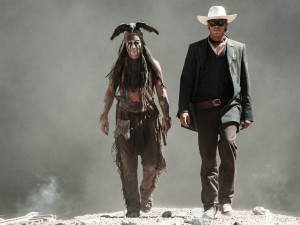Lone Ranger — A Bad Movie Sparks Some Good Comments
Posted on July 13, 2013 at 8:00 am
It’s often more fun to read about a bad movie than a good one (more fun to write about a bad one, too). “The Lone Ranger” is not a terrible movie. It does not inspire the kind of horrified hyperbole of legendary hubristic disasters like “Battlefield Earth” but it is the kind of bad movie that inspires some exceptionally thoughtful insights. Some I have particularly enjoyed include:
The film has plenty of weaknesses—an unevenness of tone, a surfeit of plot convolutions, some problematic political echoes—but its central flaw is that it is absurdly, punishingly overlong. Tucked away somewhere in its 149-minute running time, there is a clever, corny summer diversion lasting perhaps an hour and three-quarters. But this is the era of the Big Cinematic Event, and if you don’t want every single dollar of a $200-million-plus budget to be waved in your face—well, you may as well stay home and watch TV….somewhere around the hour-and-a-half mark, The Lone Ranger makes the fateful decision not to end. Worse, the movie keeps not-ending for another full hour. Unnecessary backstories unspool, tiresome gimmicks get rolled out—look! there’s Helena Bonham Carter as a tough-but-decent prostitute whose wooden leg is really a gun—and dull new villains are revealed to be behind the perfectly compelling originals. The final action sequence (also set on a train) proves to be as exhausting as the first was amusing, with the body count escalating unpleasantly and the William Tell Overture—used sparingly throughout most of the film—commencing to trample everything in its path.
This leads to an hilarious discussion of more movies that should have done more with less.
I can’t say whether I might enjoy a Transformers movie that was under two hours long—but one reason that I can’t say is because the ones that Michael Bay has offered up to us have clocked in at 144, 149, and 154 minutes respectively. And it’s not just the summer blockbusters: Les Miserables was a polished, well-crafted film that labored under the misconception that viewers wanted to pass the 19th century in real time. And don’t get me started on Peter Jackson’s first installment of The Hobbit or, like the movie itself, I might never stop.
The movie does not have much of interest to say about race, but the critics do. Johnny Depp, who co-produced and played Tonto as a much more central character than in previous versions, claims Native American ancestry and says he based the character on research. And producer Jerry Bruckheimer insisted that ” Native American community…is so behind this movie, it’s fantastic.” There were Native American consultants on set and performers on screen, and the production raised money for Indian scholarships. But Indian Country Today says that it may not be possible to present the story of the Indian sidekick without racist overtones.
And New York Magazine’s Vulture blog uses everything that’s wrong with the movie to talk about everything that’s wrong with Hollywood. I especially endorse the idea of skipping the origin stories and getting down to it, as the originators of the origin story, comic books, understood from, well, the beginning.
Even the most widely criticized movie has its defenders, and I always like to listen to those who see more in a movie than I do. On Rogerebert.com, Matt Zoller Seitz wrote an excellent review about the small, personal film he found inside the blockbuster:
or all its miscalculations, this is a personal picture, violent and sweet, clever and goofy. It’s as obsessive and overbearing as Steven Spielberg’s “1941” — and, I’ll bet, as likely to be re-evaluated twenty years from now, and described as “misunderstood.”…How do you adapt the Ranger for multicultural, post-9/11, post-financial-meltdown America? That’s the question. The filmmakers grapple with it amusingly, and throw in large-scale action, broad slapstick, and black-comedy banter while they’re at it.
